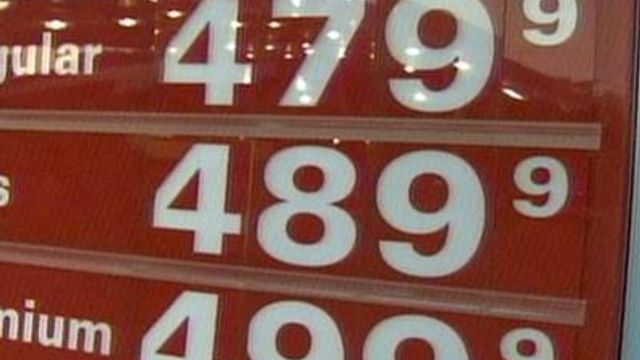RALEIGH, N.C. — A weekend surge sent the average gasoline price in North Carolina above $4 a gallon Monday, according to industry reports, driven by concerns that Hurricane Ike's damage to oil facilities will cause supply shortages.
A report compiled by the Oil Price Information Service, Wright Express and AAA showed the statewide average for regular unleaded was at $4.085 Monday morning, up from $3.973 per gallon on Sunday and far above prices at the end of last week.
Monday's prices set a new record high for North Carolina. The previous record of $4.05 was set on July 17 when a barrel of oil cost more than $150. The average price a month ago was $3.712, and the average a year ago was $2.751.
Three of the six metropolitan areas surveyed – Asheville, Charlotte and the Triad – set new record highs Monday. In Asheville, gas prices exceeded $4.30 a gallon.
Raleigh missed setting a new record – by one hundredth of a cent. Triangle drivers were paying an average of $4.053 for a gallon of gas.
Only Fayetteville and Wilmington drivers were spared average gas prices under $4.
Statewide gas prices have jumped 40 cents since Friday.
The cost at the gas pump has fluctuated wildly since Friday, with some stations posting prices over $5 and long lines forming at others with prices as low as $3.59.
State, federal governments probe price gouging
North Carolina Attorney General Roy Cooper said the state will take the first step in investigating claims of price gouging by sending subpoenas to certain gas stations Monday. Companies face a civil penalty of up to $5,000 for each violation of the price-gouging law.
“Any station or any wholesaler that’s trying to take advantage of this situation and is gouging consumers will face the music from our office,” Cooper said.
Cooper scheduled a 2:30 p.m. news conference Monday to discuss the investigation into possible price-gouging. Watch it live on WRAL.com.
The attorney general’s office will be looking for “unreasonably excessive” prices, Cooper said. “It’s one of those things where you know it when you see it."
Drivers should "shop around" and not get gas unless they need to, Cooper advised.
The state Consumer Protection Division has received more than 1,000 complaints since Friday. Due to the high volume of calls, consumers are urged to print out the complaint form from the
division’s Web site and mail it to the office.
President George Bush also said the federal government would keep out a vigilant eye for price gouging.
"The federal government, along with state governments, will be monitoring very carefully as to whether or not consumers are being mistreated at the pump – in other words, gouged," Bush said. "It's very important for our fellow citizens during this period of temporary disruption to be treated fairly."
Cooper cautioned, though, that high gas prices do not necessarily equate to price gouging. The station could be charged high prices by its wholesalers. The wholesale price of Gulf Coast gas rose to $4.85 Friday.
Many stations have contracts to buy gas from suppliers based on prices set by those markets, said Tom Kloza, chief oil analyst with the Oil Price Information Service.
"They aren't gouging; they are simply passing along the wholesale cost," he said. However, a small percentage of stations owned by major oil companies are somewhat insulated from these forces, enabling them to keep prices lower.
Such conditions could last for another few weeks, depending on how quickly Texas and Louisiana refineries shuttered by Ike can come back on line.
Prices are more likely to be higher throughout the Southeast, because those states get fuel from Gulf refineries, Kloza said.
However, he predicted that nationwide prices would begin falling later in the fall, perhaps to as low as $3 a gallon by year's end, based on current oil prices of about $100 per barrel.
Damage might be less than feared
Preliminary assessments showed that Ike might have done less damage than feared to oil facilities along Texas' Gulf Coast, which has about a fifth of the nation's refining capacity.
The storm's eye missed the center of Houston – home to the nation's largest concentration of oil and gas refineries. The storm surge was also less severe than predicted, potentially sparing refineries from additional flooding.
However, the lack of electricity in and around Houston and western Louisiana – major hubs for oil refiners – poses a significant challenge for the energy industry. Such outages could keep millions of gallons of gasoline output idled for at least several days.
Valero's refineries at Houston, Texas City and Port Arthur remain shut down, and all three have lost power. The Sabine Pipe Line, a crucial natural gas conduit, has also been shut down.
Late Saturday, the U.S. Minerals Management Service said two drilling rigs were adrift in the central Gulf of Mexico, about 100 miles off the Louisiana coast. Regional director Lars Herbst said the rigs had been relatively stationary and tugs would secure the rigs when sea conditions allow.
Ahead of the storm, operators shut down 14 Texas refineries with a total capacity of 3.8 million barrels of crude a day, or about 20 percent of the country's total output.
Some refineries already had been shut down for nearly two weeks after Hurricane Gustav.





